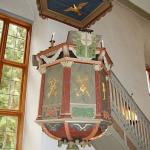On the anniversary of 9-11, comes below a piece written shortly after the attack in response to the overwhelming invocation of God’s favor upon the United States. This is from the October issue of The Nicotine Theological Journal:
God Damn Mr. Laden
The phrase, “God damn,” is one that devout Christians are not supposed to utter. Depending on how it’s said, it violates the Third Commandment which, as the Heidelberg Catechism puts it, forbids blaspheming and misusing the name of God “by cursing, perjury, or unnecessary oaths.” “God damn” would appear to fall into the category of cursing. That may explain why the only time I’ve heard a minister of the gospel say these words, and with noted effect, was when describing Jesus Christ on the cross, who bearing the sins of his people, was at that moment a “God-damned sinner.” The rest of those in the congregation that Sunday morning shifted nervously.
The recent terrorist attack on the World Trade Center and the Pentagon, combined with the response of many Americans with a show of flags and the singing of “God Bless America,” have raised questions about Third Commandment and taking the Lord’s name in vain. Why is it wrong to say “God damn” but okay to say “God bless”? Surely the latter phrase isn’t a form of cursing by the lights of Heidelberg’s authors. But does “God bless” qualify, as Q&A 99 goes on to say, as the use of God’s holy name “with reverence and awe.” When it is as common as hand-painted messages on the rear windows of cars mixed with America’s civil religion of national messianism, the phrase “God bless” could legitimately be counted as a kind of cuss word. And yet few Christians seem to be aware that the Third Commandment requires the careful invoking of God’s name. In fact, because the idea that God has a special affection for the United States runs so deep in the American Protestant soul, responding to the terrorist attack with the phrase, “God bless,” is as natural as the Irish Catholic uttering “glory be” in reaction to a marvelous or unusual occurrence.
Questing the invocation of God’s blessing in these troubled times is just one way of trying to figure out the propriety of the American public’s response to the events of September 11. The most popular reaction has been to put up a United States flag, a boon to flag sales and makers across the land. But why respond to the symbolic attack (and it was very bloody and very destructive and so more than symbolic) on the West and its culture with a symbol? It could be that this is simply a way of affirming what the terrorists hate. But it also leads to an unthinking esteem for everything for which the United States stands, as if the Red, White and Blue were synonymous with the True, the Good and the Beautiful. In fact, one of the more curious reactions to the attack has been what this will mean for the economy, with lots of urging for Americans to spend as freely as the legislators in Washington have during the past few weeks. So maybe the terrorists had it right. America really is “about the economy, stupid.”
Let’s be clear. The issue isn’t simply the United States’ policy of legalized abortion that should raise questions about a show of allegiance to the symbol of American freedom. In the minds of some, the American flag symbolizes the liberty of mothers and the physicians they employ to choose to kill the life in a woman’s womb. The issue of America’s meaning also involves questions about globalization and exporting American culture to nations and cultures that might want something more wholesome but lack the means to make their cultural goods as inexpensive as a Super-Size Real Meal Deal or whatever the heck is the most recent sale at the Golden Arches.
And this is why the show of American flags makes us a little nervous. We do not sympathize with the terrorists or their culture. In fact, their hideous acts of September 11 prompt us to support whatever President Bush decides to do. But does our hatred of them and their actions require us to salute all that for which America stands? Can’t we question some of the ways America’s noble experiment have played out? Isn’t it possible to recognize the irony that America’s commitment to freedom also leads to such displays of liberty as American servicemen looking at Playboy while stationed around the world as the earth’s cops?
This is the reason why we need another way of responding to the tragedy and showing signs of support for the war against terrorism. It can’t be a simple show of the flag, as if everything that symbol stands for is pure and innocent, deserving all our allegiance. Instead, we need a sign that shows our hatred of the kind of wickedness manifest in this unjust slaughter of life and property. “God Damn Mr. Laden,” is what we have in mind. It implies, contra the prevailing evangelical sentiment, that God not only hates sin but also some sinners. But for those squeamish about violating the Third Commandment, how about a banner with Osama’s face in a circle with a diagonal slash across his face? That’s a symbol that is not as ambiguous as the American flag and may well be even more unifying.












